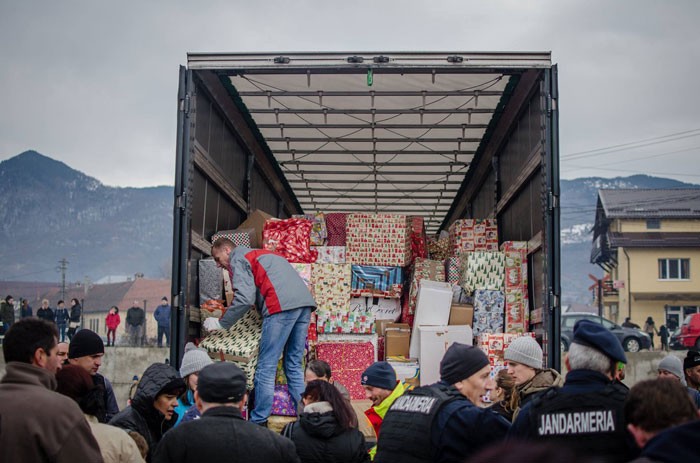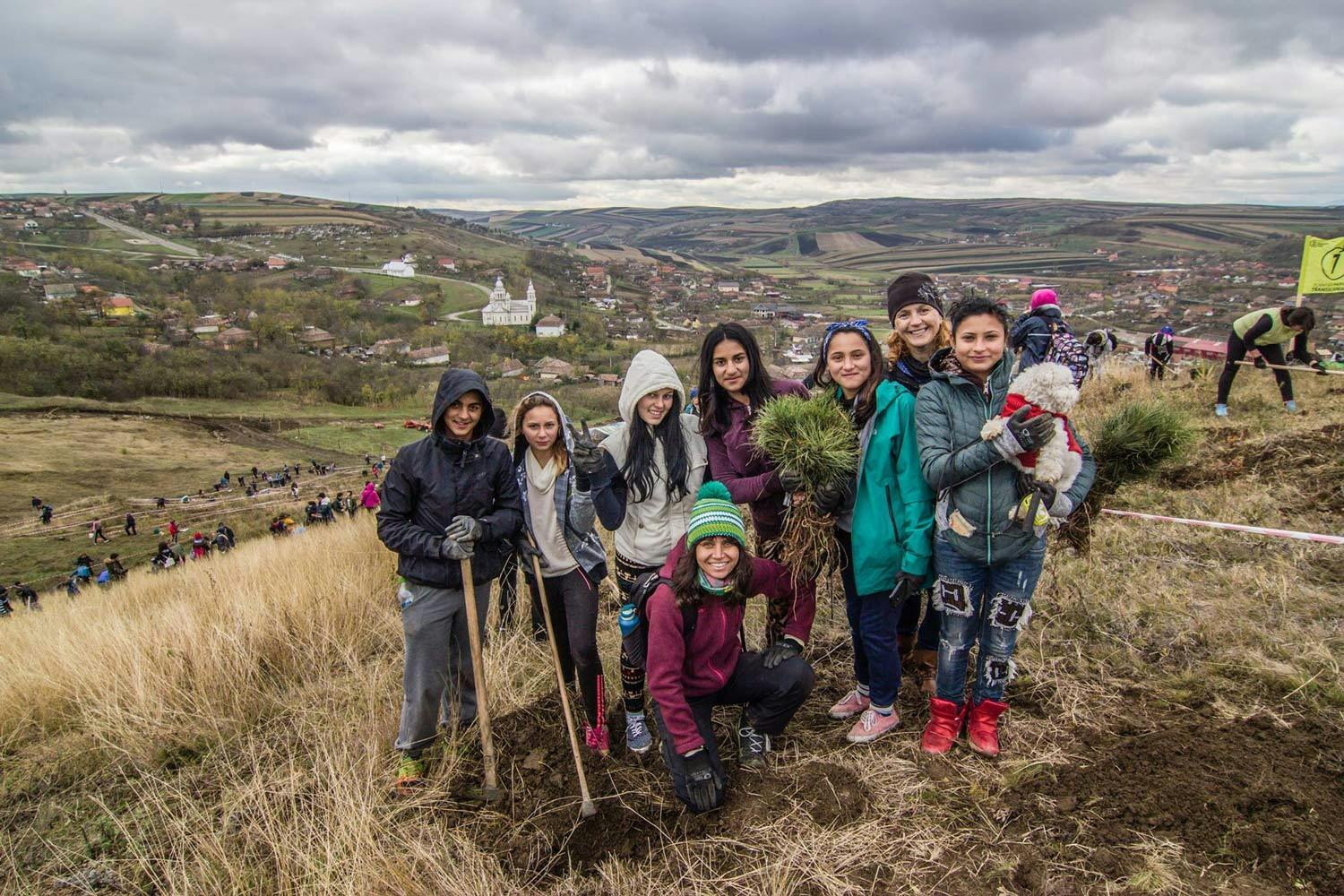How the Spirit of Giving Helps Preserve Romania’s Forests
An organization that started by playing Santa now protects Transylvania’s forests, and inspires young volunteers.
Teenage volunteers participate in a tree-planting event put on by Romanian charity Taşuleasa Social.
When most people hear “Transylvania,” they think of bloodthirsty vampires, not jolly festive elves. But holiday magic is exactly what nonprofit Taşuleasa Social has brought to that region of Romania since 2001. As its operations expand, the local community is increasingly aglow with the spirit of voluntarism and a passion for forest preservation.
Taşuleasea — pronounced TA-shoo-lay-A-sa, “Taşu” for short — began with a project known in English as “Santa’s Truckers.” Started as a partnership with Die Johanniter — a Christian organization in Germany that provides medical education and relief services around the world — Santa’s Truckers distributes thousands of care packages to Transylvanian families every Christmas. Taşu founder Alin Uhlmann Ușeriu was living in Germany and volunteering with Die Johanniter when they tapped him to help expand their work into Romania.
“They asked him, ‘Can you help us do something in Romania?’” explains Ana Szekely, executive director at Taşuleasa. “It started as a caring action, donations for helping other people, and then it evolved.”
One of the things that evolved was the Taşuleasa campus — the organization’s headquarters in the Carpathian Mountains, outside the village of Piatra Fântânele. The property is dotted with cabin-style dormitories and outbuildings overlooking an Insta-worthy panorama. A barn-size building holds a kitchen and gathering space, where volunteers — like the high-school service-learning group from Istanbul I chaperoned there this summer — share meals, play games, and chat over fruit tea. Outside, raspberry canes spill over the wooden fence of a kitchen garden, and dogs frolic. There are chickens.
Illegal forestry operations log about 20 million cubic meters of wood annually, according to Romania’s environment minister.
The campus serves as the focal point for Taşu’s programs promoting voluntarism, and protecting Romania’s dense old-growth forests (some of the last in Europe). Timber demand from multinational furniture manufacturers like IKEA is straining Romanian resources. In addition to the legal industry — which NGOs have petitioned the EU to curb — illegal operations also log about 20 million cubic meters of wood annually, according to Romania’s environment minister. Against this backdrop, Taşu created a pedagogical forest where area school-children learn about local flora and fauna. Tours are led by Romanian teens in the organization’s leadership program, a multi-year volunteer commitment I was told they clamor to get into.
Volunteers serve as clean-up crew, hiking guides, and de facto project coordinators, liaising between staff and the volunteer groups Taşu regularly hosts. The organization’s nature-focused mission attracts volunteers like 18-year-old “Mihai the Curly” (not to be confused with the other two Mihais on site). But teens also relate to Taşuleasa’s carefully crafted brand, conveyed through “supercool” YouTube videos (to borrow Mihai’s catchphrase) like an animated account of Taşu’s founding, community tree-planting events (almost 1 million trees planted so far), and performances by Mission: Impossible actor and Taşu board member Marcel Iures.

Volunteers unload a truckload of gifts in a Transylvanian village a few days after Christmas. The Santa’s Truckers project creates goodwill among communities where Taşuleasa operates, and inspires local children to volunteer.
All Taşu projects serve many purposes. Santa’s Truckers is about sharing, but also about building local goodwill, which Szekely suggests is critical to the success of Taşu’s most ambitious project to date: Via Transilvanica. The 1,000-kilometer hiking trail will run through mountain villages, wend around homesteads, and, hopefully, bring tourism to the area. Nearly 400 kilometers have already been completed, and they run through the five-county zone where Santa’s Truckers deliver gifts every December 28.
North Americans may imagine that day playing out like the trope of underprivileged children with their eyes all aglow receiving donated toys their parents couldn’t afford. It doesn’t. For one, kids getting what they want for Christmas isn’t the point. In a totally un-American move, they don’t get toys. Instead, children receive care packages with things like toothpaste, shower gel, books, coloring books, sugar, flour, macaroni, chocolate, and oil — “Everything the family needs” for about two weeks, says Szekely.
Kids getting what they want for Christmas isn’t the point.
Santa’s Truckers’ initial goal was to provide gifts to poor communities; however, with Romania’s 2007 acceptance into the European Union and accompanying economic growth, Szekely thinks the financial need is no longer as great. Today, she feels the project is more about community. The children get help from their parents and volunteering firefighters to unload the 10-plus-kilogram packages, which they couldn’t lift alone. Witnessing the truckers, teachers, firefighters, police, and Taşu staff volunteering together is the real gift that keeps on giving.
“They are learning about volunteering because almost a thousand volunteers [are involved in] this activity,” says Szekely, who notes the kids take pride in providing the gifted items for their families. “They see the truckers and everyone in the cold who are giving out these presents, and so they are trying to be like them.”
Correction: When this article was published in print, it identified “Mihai the Curly” as 15 years old. He began volunteering with Taşuleasa at 15, but is now 18 years old.
Print Issue: Winter/Spring 2020
Print Title: The Gift of Giving Back
